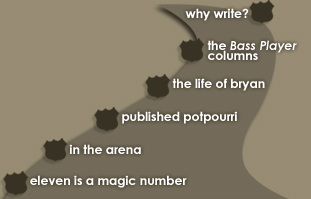 PERCEPTION
IS REALITY
PERCEPTION
IS REALITY
bryan beller (7.30.00)
The battle
for the middle of the American political spectrum continues, and right
now George W. Bush is winning. Why? Because of what Bush has been
able to do since the end of the primary season that Al Gore has not:
become secure enough with his base to create the perception
that he holds positions outside his party's traditional ideology.
Richard Nixon once summed up the challenge facing presidential candidates
very neatly. It was his view that, in the primaries, you should run
as far to the right (or if Democratic, left) as necessary to defeat
your opponents. Then, once the nomination is secure, run for the center
as fast as you can in the general election without offending your
base so much that they don't show up at the polls in November. The
trick is not to run too far to one side or the other, or you may have
a difficult time getting back from the fringe. Following this theory,
Gore held a tremendous advantage over Bush once the primaries ended,
as the strong challenge from Sen. John McCain pushed Bush far to the
right of his desired post-primary position. Yet Bush has consistently
led all polls with swing voters from May onward. Did Gore blow it,
or did Bush craft a better strategy over the past three months? Both.
Let's start with Gore. He was in an enviable position after defeating
Bill Bradley. Bradley challenged Gore from the left, allowing Gore
to sit closer to the middle by trashing Bradley as an "old Democrat"
- just the kind of words the general election swing voters like to
hear, as evidenced by Bill Clinton's successful positioning as a "new
Democrat" over the past eight years. The Gore-ing of Bradley's leftist
positions didn't cost Al any support among traditional Democratic
primary voters, either. Bradley struggled to reach 20% in some primary
returns. Better yet, Gore didn't have to spend a lot of money to get
those numbers. So you had an incumbent Vice President, flush with
cash, with enough stated traditional Democratic positions and party
support to stretch out towards the center, lying in wait for a wounded,
right-leaning Bush in the general.
Then along came Elian Gonzalez.
I don't know what Gore was thinking. By favoring the government's
intervention - i.e., keeping Elian in the States by federal decree
against his father's wishes - into what the overwhelming majority
of Americans saw as a private family matter, the Republicans were
caught in a hypocrisy trap of the highest order. Essentially they
were saying, we are the party of less government and judicial restraint
unless it suits our domestic and international political agenda. The
Cuban-American lobby was becoming hysterical over the issue, and they
were losing support throughout Congress and in repeated polls. The
Clinton administration was favoring a forced entry, and it doesn't
take a genius to figure out that Gore knew what was coming ahead of
time.
So what did Gore do? In a misguided fit of Florida electoral vote
greediness (the Cubans control many districts in southern Florida),
and a desire to break with the Clinton administration on any substantive
issue that could benefit him, he came out in support of keeping Elian
in the U.S. It was probably an effort to get closer to the middle,
but it was too fast, too soon, and too transparent.
Democrats who'd been fighting the anti-Castro-at-all-costs U.S. policy
on Cuba for twenty years were astounded. The right had beaten them
over the head for being "soft on Communism" for a generation. Yet
the Soviet Union had been dead for ten years, Cuba was about as threatening
to the U.S. as Costa Rica, and the support for a change in policy
had been mounting for years. It was the perfect time for Gore to show
the Republicans that the emperor had no clothes.and he decided to
show everyone how tough he was on Castro? Now?
The floodgates of criticism opened, and he was rightly punished. Republicans
chastised him for a last-minute opportunistic position switch, one
that Bush - right or wrong - had held all along. Democrats flailed
him publicly on talk shows. Worst of all, the American people saw
right through it. When the raid on the Miami relatives' home was carried
out successfully just a week after Gore's flip-flop - a Janet Reno
decision that took some real cojones to make, especially post-Waco
- Republicans tried to make a big deal out of it and wanted to call
Congressional hearings on the matter. When they found that some 70%
of polled citizens had no interest in such hearings, the GOP turned
tail and ran away. Gore was left sitting empty-handed, appearing to
have both been politically expedient and intellectually unwise as
a decision maker.
Worse, it exposed the fact that Gore's support may be just as thin
as it is wide. Dems have never been fanatical about their preference
for Gore; he's just the man of the moment. Labor unions have had a
beef with Clinton-Gore since their endorsement and passage of NAFTA,
and they started flexing their muscle, talking about possibly endorsing
Ralph Nader as payback. Gore's charisma and campaigning ability not
nearly being enough to carry the day through tough political times
- unlike a certain Democratic icon of late - he was forced to run
back to the left after the primary season ended. Hence his
appearances with environmentalists, teachers' unions, labor unions,
etc. He's here to fight for the "people, not the powerful." He exclaims
how he's always been there for the traditional Democratic constituencies,
and he'll continue to fight for them against "big business, big tobacco
and big oil." That's great, but this all should have been over already.
Name one thing that Gore has done since May to create the perception
that he's any different than the Democrats of old, other than break
with the Clinton administration on Elian. You can't, because he hasn't.
And he's still trying to get back to the middle to this day.
The Elian Gonzalez issue was a tangential affair, but on such things
do presidential races turn. When Gore slipped, Bush took full advantage.
After having disposed of McCain in a nasty primary affair by having
run to the right - OK, the extreme right in South Carolina
- Bush immediately began working on softening his image. He spoke
of the reflexive right-wing hatred of government in a negative context.
He talked about targeted tax cuts for the middle class. He went to
California, denounced the infamous Proposition 187 (an anti-immigrant
measure that haunts California Republicans to this day), and spoke
some Spanish. He also attended the National Council of La Raza, the
largest Hispanic political organization in America, and gave a well-received
speech (can you imagine Bob Dole or Bush Sr. doing such a thing?).
He even gave a speech for the NAACP, admitting that "the party of
Lincoln" has not always carried the "mantle of Lincoln." Nothing about
abortion, culture war, or Jesus Christ being his favorite philosopher,
no sir.
And the right-wing knows better than to get too out of line; they've
been out of presidential power for too long, and are more than willing
to keep their mouths shut if it means getting W. into office. Pat
Buchanan is a non-entity this time around as he scrambles for Reform
Party support. Gore enjoys no such current luxury on his left flank,
as Ralph Nader is polling a crucial 5% in important states like Michigan
and California.
The Republican convention will be the cementing of Bush's new friendly,
centrist image. (This column was filed prior to the convention
taking place.) There will be none of the traditional Democrat-bashing
(in the past, the GOP had dedicated an entire night to such a cause).
Look at the speakers slated to appear: Elizabeth Dole, Condoleezza
Rice (a female foreign policy expert), Colin Powell, W.'s wife Laura,
some Virginia State Representative named Paul Harris (a Republican
black man, apparently the only GOP African-American elected official
they could find not named J.C. Watts) - does this strike you as odd?
Who would have thought that, to paraphrase New Republic columnist
Michelle Cottle, the 2000 Republican National Convention would look
like a United Colors of Benetton billboard?
The GOP, under Bush's direction, has finally learned the lesson than
Clinton has beaten into them. With the right candidate (this strategy
would probably not be working with Bob Dole as its mouthpiece), you
can campaign in the middle while holding positions inside your own
party's stated platform. The trick - as I've noted in italics
throughout this column - is simply to create the appearance
of centrist positions. George W. Bush does not share the agenda of
the NAACP, but by simply appearing before them and uttering some apologetic
remarks, he's created the impression that he's not a Neanderthal right-winger,
even if he was acting like one only five months ago in South Carolina.
And for a more realistic view of where Bush really stands, look at
the positions of his chosen Vice-Presidential running mate Dick Cheney,
who while serving in Congress as a Representative of the State of
Wyoming:
. Opposed abortion rights and voted against federal funding of abortions
even in cases of rape, incest or when the pregnancy threatened the
woman's life.
. Opposed gun control measures, including a ban on imports of plastic
guns that could be smuggled past metal detectors and armor piercing
bullets.
. Opposed a resolution urging South Africa to release Nelson Mandela
from prison.
. Opposed the reauthorization of funding for Head Start, a widely-supported
low-income educational program
These are not the positions of a "compassionate conservative." The
Cheney pick is an obvious bone for the Christian Coalition, who immediately
approved of the choice in several press releases. Bush's own positions
are not far from these, and his choice of Cheney reflects tacit approval
of these positions, but that's hardly the perception he's been working
hard to successfully create.
That the Gore campaign has allowed this transformation to occur unchallenged
is their own fault; they're still busy trying to secure the support
of labor unions.
While it's worth remembering that Michael Dukakis held a seventeen-point
lead over George Bush (like Gore, a charismatically-challenged sitting
Vice President who had trouble living up to his twice-elected predecessor)
after the 1988 Democratic National Convention and went on to lose
the election, Gore had better get his act together, sew up his base's
support, focus his message on fighting Bush for who really is the
more centrist candidate, and stop waiting for the debates to do so.
The current battle for the American presidency is a battle of perception
of moderation, and it's one that Gore is losing badly.


